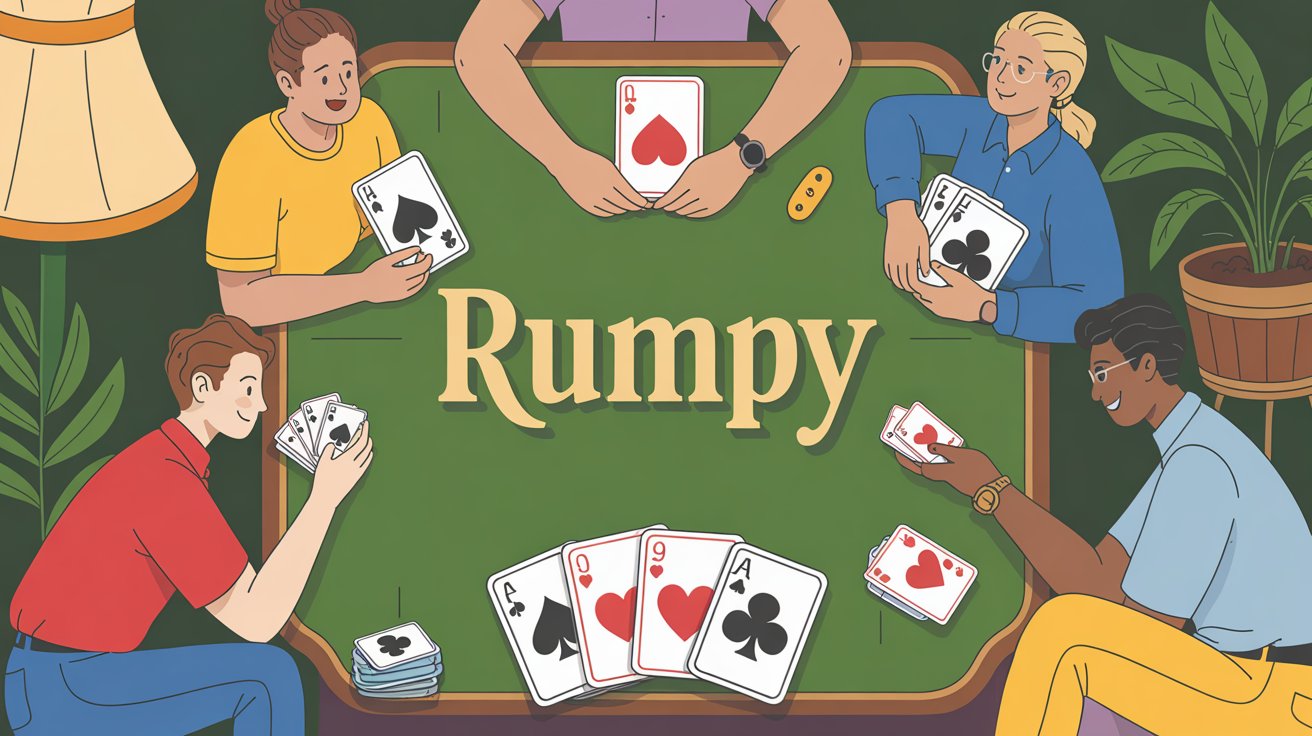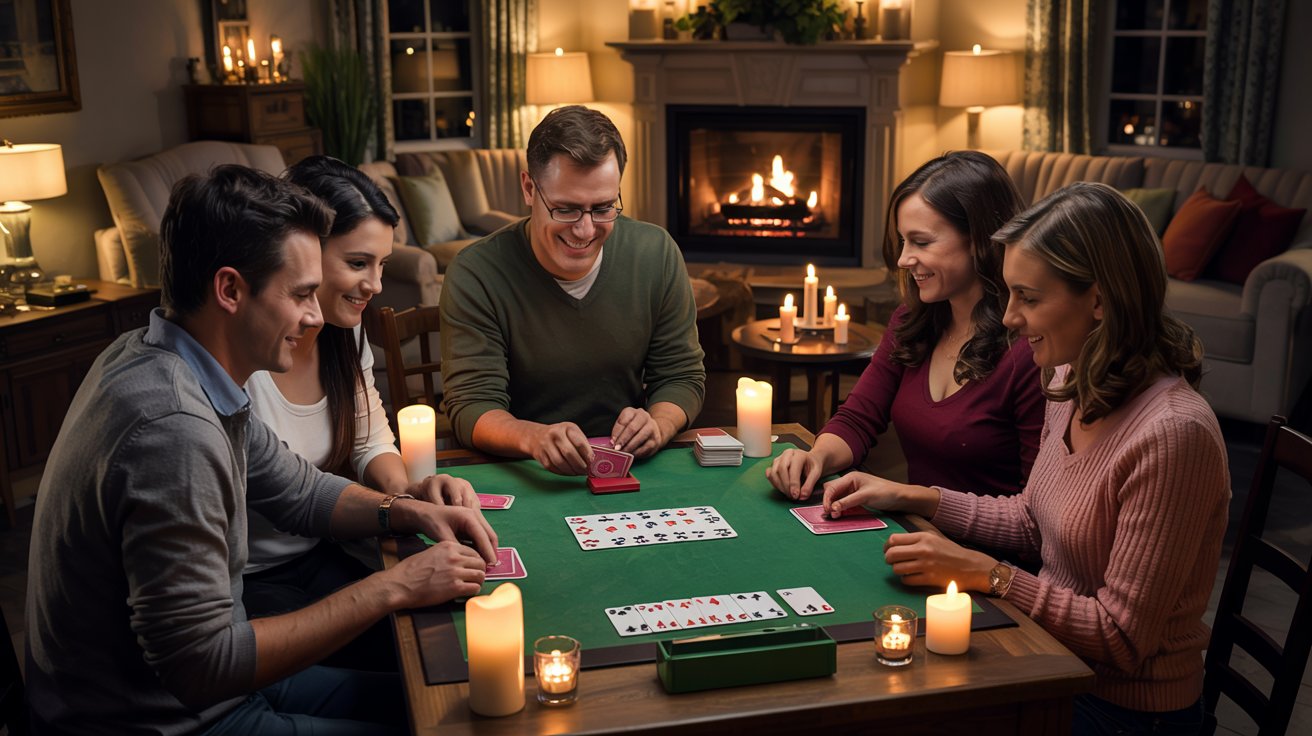In our digitally dependent world, a power outage can feel like stepping back in time. Suddenly, our screens go dark, and we’re left wondering how to pass the time. But what if I told you that a power outage could be the perfect opportunity to reconnect with one of the most beloved card games of all time? Enter rummy – the classic game that requires nothing more than a deck of cards, some basic knowledge, and a few willing participants.
Whether you’re a seasoned rummy player or someone who’s never shuffled a deck in their life, this comprehensive guide will walk you through everything you need to know about playing rummy during a power outage. From setting up the perfect atmosphere to mastering strategies by candlelight, we’ve got you covered.
Why Rummy is Perfect for Power Outages
When the lights go out, rummy shines brightest. Unlike video games or streaming services, rummy doesn’t require electricity, Wi-Fi, or charged devices. All you need is a standard deck of cards and a flat surface – making it the ideal entertainment during unexpected power outages.
Rummy has stood the test of time for good reason. It combines strategy and luck in perfect balance, making each game unpredictable and engaging. The rules are simple enough for beginners to learn quickly, yet the gameplay offers enough depth to keep experienced players challenged and entertained.
Moreover, rummy creates an opportunity for genuine face-to-face interaction – something we often miss in our screen-dominated lives. A power outage might just be the nudge you need to rediscover the joy of sitting around a table, sharing stories, and engaging in friendly competition.
Essential Preparations
Being prepared for power outages means thinking beyond just emergency lighting and food supplies. Having entertainment options ready is equally important for maintaining morale and passing time comfortably. Here’s what you should have on hand:
Card Game Essentials:
- Multiple Decks of Cards: Keep at least two standard 52-card decks. Cards can get damaged or lost, and some rummy variations require multiple decks.
- Score Pad and Pencils: Old-fashioned paper scoring is reliable when digital options aren’t available.
- Card Holders: These aren’t strictly necessary but can be helpful for children or elderly players who might struggle to hold many cards.
Lighting Solutions:
- Battery-Powered Lanterns: These provide better ambient lighting than flashlights.
- Candles and Matches: Create atmosphere while providing functional light.
- Headlamps: Allow for hands-free illumination directly on your cards.
Comfort Items:
- Non-Perishable Snacks: Playing cards works up an appetite!
- Bottled Water or Thermos with Hot Drinks: Stay hydrated during extended play.
- Cushions or Portable Seating: Comfort is key for longer gaming sessions.
Pro Tip: Create a dedicated “Power Outage Entertainment Kit” that includes these items along with your cards. Store it somewhere easily accessible so you’re not fumbling in the dark when the lights go out.
Basic Rummy Rules

Before diving into specialized strategies, let’s review the fundamental rules of classic rummy. If you’ve never played before, or need a refresher, here’s everything you need to know:
Objective:
The goal of rummy is to form valid combinations of cards (sets and runs) and be the first to “go out” by getting rid of all your cards.
Card Values:
- Face cards (J, Q, K): 10 points each
- Ace: 1 point (sometimes 11 points, depending on house rules)
- Number cards: Face value (2=2 points, 3=3 points, etc.)
Setup:
- Determine the dealer by having each player draw a card. Lowest card deals first.
- For 2-3 players, deal 10 cards each.
- For 4 or more players, deal 7 cards each.
- Place the remaining cards face down to form the draw pile.
- Turn the top card of the draw pile face up to start the discard pile.
Gameplay:
- Starting with the player to the dealer’s left, each turn consists of:
- Drawing one card (either from the draw pile or the top card from the discard pile)
- Forming and laying down valid combinations (optional)
- Discarding one card face up on the discard pile
Valid Combinations:
- Sets: Three or four cards of the same rank (e.g., three 8s, four Queens)
- Runs: Three or more consecutive cards of the same suit (e.g., 5-6-7 of hearts)
Going Out:
To win the round, a player must:
- Form all their cards into valid combinations
- Discard their last card
Scoring:
When a player goes out:
- They score zero for that round
- Other players add up the point values of their remaining unmatched cards
- The player with the lowest total score after a predetermined number of rounds wins
During a power outage, simplifying these rules for beginners or younger players can make the game more accessible and enjoyable for everyone.
Setting Up Your Power-Free Game Space

Creating the right atmosphere can transform a frustrating power outage into a memorable game night. Here’s how to set up the perfect rummy environment when the electricity is out:
Lighting Considerations:
The most critical aspect of playing cards during a power outage is ensuring adequate lighting. Position your light sources to minimize shadows and glare on the cards:
- Place lanterns or candles slightly above and behind players, not directly on the playing surface
- If using candles, opt for broader pillar candles rather than tapered ones, as they provide more stable light
- Battery-operated string lights draped around your playing area create both functional lighting and a festive atmosphere
Safety note: Always keep open flames away from cards and at a safe distance from players, especially children. Never leave burning candles unattended.
Table Setup:
- Choose a table with enough space for all players to see their cards and reach the draw/discard piles
- A round table works best as it gives equal access to all players
- If using a rectangular table, position the draw and discard piles in the center
- Non-slip tablecloths or mats can prevent cards from sliding in the dimmer lighting
Seating Arrangements:
- Arrange seating to ensure everyone can see their cards without straining
- Consider using cushions or pillows for comfort during extended play
- If floor seating is necessary, create a circle with cushions around a low coffee table
Temperature Control:
Power outages often mean losing heating or air conditioning. Keep your gaming area comfortable by:
- In cold weather: Gather in a smaller room that retains heat better, and have blankets available
- In hot weather: Choose the coolest room in the house, typically a basement or north-facing room, and use battery-operated fans
Minimizing Distractions:
- Keep the game area clear of unnecessary items that might confuse the play in low light
- Designate a specific place for drinks to prevent spills on cards
- Have a small container ready for discarded snack wrappers and other trash
With thoughtful preparation, your power outage rummy space can become so inviting that players might not even mind when the electricity returns!
Rummy Variations for Different Group Sizes
One of rummy’s greatest strengths is its adaptability to various player counts. Here are some popular variations perfect for power outages, organized by group size:
For Two Players: Gin Rummy
Gin Rummy is perfect for intimate gameplay when it’s just you and one other person waiting out the blackout.
- Setup: Deal 10 cards to each player
- Objective: Create melds and reduce the value of unmatched cards
- Unique Feature: Players can “knock” when their unmatched cards total 10 points or less
- Why It Works During Outages: Quick rounds keep engagement high with minimal lighting needs
For Three to Four Players: Contract Rummy
Also known as Phase 10 (in its commercial version), this variation keeps multiple players invested throughout the game.
- Setup: Deal 10 cards to each player
- Objective: Complete a series of increasingly difficult “contracts” or phases
- Unique Feature: Players must complete each phase in sequence before moving to the next
- Why It Works During Outages: The phase structure creates natural breaks where players can rest their eyes from the dim lighting
For Five or More Players: Liverpool Rummy
When your power outage has gathered the whole family or several neighbors, Liverpool Rummy keeps everyone involved.
- Setup: Uses two decks (including jokers) with 7-10 cards per player depending on the round
- Objective: Complete specific contracts in each round (such as “two sets and a run”)
- Unique Feature: Contracts change every round, increasing in difficulty
- Why It Works During Outages: The changing contracts keep the game fresh during extended blackouts
For Mixed Age Groups: Go Fish Rummy
When your power outage party includes children, this simplified version combines familiar Go Fish elements with basic rummy concepts.
- Setup: Deal 7 cards to each player
- Objective: Collect sets of three or four of a kind
- Unique Feature: Players can ask others for specific cards they need
- Why It Works During Outages: Simple rules mean even younger children can participate with minimal frustration
Tournament Option: Progressive Rummy
For lengthy power outages where you want to create a more structured event:
- Setup: Players rotate tables after each round
- Objective: Score the lowest points across all rounds
- Unique Feature: Each table plays a different rummy variation
- Why It Works During Outages: The movement between tables keeps energy high and prevents players from getting stiff in the limited lighting
Remember to explain the chosen variation clearly before starting, as confused players and dim lighting can be a frustrating combination. Having a printed rule sheet prepared in your emergency kit can be invaluable when digital references aren’t available.
Strategic Tips by Candlelight

Playing rummy in low light presents unique challenges and opportunities. Here are some specialized strategies that work particularly well during power outages:
Memory-Focused Approach
When visibility is limited, developing your memory becomes a powerful advantage:
- Pay extra attention to discarded cards, especially those discarded early in the game
- Mentally track patterns in opponents’ pickups and discards
- Consider arranging your hand in a consistent way that helps you remember what you’re holding
Simplified Hand Management
In dim lighting, organization is crucial:
- Arrange cards by suit and sequence rather than holding them in the order dealt
- Keep potential melds grouped together in your hand
- Consider discarding “orphan” cards that aren’t contributing to potential melds, even if they’re low value
Discard Strategy Adjustments
Power outage lighting requires adapted discard thinking:
- Favor discarding face cards (which are easier to recognize in low light) when appropriate
- Be more conservative about picking from the discard pile, as you might miss important visual cues from opponents
- When in doubt about what to discard, prioritize getting rid of cards with higher point values
Social Awareness
Use the intimate atmosphere to your advantage:
- Pay attention to expressions and reactions even in dim light
- Listen for subtle sounds like sharp intakes of breath that might indicate a valuable pickup
- Use conversation strategically to gather information without giving away your own hand
Practical Tips for Low-Light Play
- Hold your cards closer to your light source when making decisions
- When picking up cards, tilt them slightly toward the light before adding them to your hand
- Announce your actions clearly (“drawing from the deck,” “discarding the seven of hearts”) to avoid confusion
Energy Conservation
During extended power outages, pacing yourself becomes important:
- Take short breaks between games to rest your eyes
- Consider playing shorter rounds if the lighting is particularly challenging
- Rotate dealing duties to share the strain of handling cards in difficult conditions
By adapting your strategy to the unique conditions of a power outage, you’ll not only improve your chances of winning but also enhance the overall experience for everyone involved.
Keeping Score Without Technology
When the power goes out, so do our usual digital scoring methods. Here’s how to maintain accurate and fair scoring using old-school techniques:
Traditional Paper Scoring
The most reliable method during a power outage:
- Create a simple scoring grid with player names across the top and round numbers down the side
- For each round, record points in the appropriate cell
- Keep a running total at the bottom to track overall standings
- Consider designating one person as the official scorekeeper for consistency
Creative Alternatives
If you’ve run out of paper or want something more interactive:
- Chip System: Use items like coins, buttons, or dried beans to represent points
- Tally Marks: Create sets of five tally marks on any available surface
- Match Stick Method: Each player starts with a certain number of matches, removing them as they accumulate points (lowest number remaining wins)
Memory-Boosting Techniques
To help remember scores between rounds:
- Announce scores clearly after each round
- Use rhymes or associations to help remember key numbers
- Create a scoring ritual where each player must repeat their current score
Scoring Shortcuts
Simplify the math when calculating in dim light:
- Round point values to the nearest 5 or 10 for easier addition
- Use “banker’s rounding” to maintain fairness
- Consider simplified scoring systems where face cards are 10 and number cards are 5
Preventing Disputes
Clear scoring protocols become especially important without digital backups:
- Have players verify their scores before cards are collected
- Implement a “challenge window” where scores can be questioned
- Use a witness system where a third party confirms high-point hands
Teaching Moment
Use the opportunity to engage younger players with practical math:
- Let children practice addition by helping with scoring
- Demonstrate shortcuts for adding groups of 10s and 5s
- Create small rewards for accurate score calculation
By maintaining organized scoring systems, you ensure that your power outage rummy games remain fair and competitive while providing an additional activity that engages different skills.
Making Rummy Fun for All Ages
Power outages affect everyone in the household, making it essential to adapt your rummy games to accommodate players of different ages and experience levels:
For Young Children (Ages 5-8)
- Simplified Rules: Reduce the complexity by focusing only on matching sets (three or four of a kind)
- Open Hands: Allow younger children to play with their cards face up, with others offering guidance
- Partnership Play: Pair children with adults who can help guide decisions without playing for them
- Visual Aids: Use rubber bands or card holders to group potential matches
For Older Children (Ages 9-12)
- Handicap System: Give younger players a head start with fewer initial cards
- Special Wild Cards: Designate certain cards as wild for younger players only
- Achievement Rewards: Create small non-score victories like “first to create a run” to keep engagement high
- Rotating Dealer Advantage: Give the youngest player a special advantage when it’s their turn to deal
For Teenagers
- Strategy Coaching: Use the power outage as an opportunity to teach deeper strategy without digital distractions
- Tournament Structure: Create a more competitive format with elimination rounds
- Responsibility Roles: Assign teens leadership roles like teaching younger players or keeping score
- Challenge Rounds: Introduce special rounds with unique rules to keep their interest
For Seniors
- Lighting Accommodation: Ensure seniors have the best lighting position at the table
- Card Adaptations: Consider larger-print cards if available
- Rest Breaks: Schedule short breaks between games to prevent eye strain
- Memory Assistance: Allow seniors to use paper to note important discards if needed
Cross-Generational Engagement
- Storytelling Integration: Share family stories or memories between rounds
- Team Formation: Create teams that mix generations for balanced play
- Knowledge Transfer: Encourage older players to share strategy tips with younger ones
- Custom House Rules: Collectively decide on special family rules that make your games unique
Turning Power Outages into Rummy Tournaments
Transform an inconvenient blackout into an exciting event by organizing a proper rummy tournament. Here’s how to structure a memorable competition when the lights go out:
Tournament Formats
Choose a structure that works for your group size and estimated outage duration:
- Round Robin: Everyone plays against everyone else (ideal for 5-8 players)
- Single Elimination: Players are out after one loss (fastest format)
- Double Elimination: Players remain in contention until losing twice (more inclusive)
- Swiss System: Players are paired against others with similar records (best for larger groups)
Setting the Stage
Create a tournament atmosphere even without electricity:
- Designate a “Tournament Director” who manages pairing and scoring
- Create a simple bracket or pairing chart on paper
- Position lighting to create a “feature table” for final rounds
- Arrange seating to minimize disruption between rounds
Adding Stakes (Without Gambling)
Make the competition meaningful without actual betting:
- Award household privileges like “choosing tomorrow’s dinner” to winners
- Create a traveling trophy from household items that gets passed to each champion
- Establish a “Power Outage Rummy Champion” title that lasts until the next outage
- Assign small chores or favors as friendly wagers
Timing Considerations
Keep the tournament moving at an appropriate pace:
- Use an hourglass or wind-up timer to limit rounds if necessary
- Implement a “shot clock” for players who take too long to make decisions
- Schedule short breaks between rounds for refreshments and strategy discussions
- Plan tournament length based on battery life of your lighting sources
Documentation for Posterity
Create a record of your power outage tournament:
- Keep a “Tournament Log” recording winners, notable plays, and funny moments
- Take photos by candlelight if your phone has battery (but save most battery for emergency use)
- Create tournament “awards” for categories like “Most Dramatic Win” or “Best Recovery”
- Start a tradition of signing the box of the card deck used in power outage tournaments
Contingency Planning
Be prepared for tournament interruptions:
- Establish rules for pausing games if power returns mid-tournament
- Create a “save state” system for continuing tournaments across multiple outages
- Have a quick concluding format ready if batteries run low or it gets too late
- Plan a special championship match to be played if the outage extends unusually long
A well-organized tournament transforms what could be a boring or stressful situation into a highlight that your family or friends might actually look forward to during future power interruptions.
Conclusion
A power outage, rather than being an inconvenience, can become an unexpected opportunity to disconnect from our digital dependencies and reconnect with one another through the timeless game of rummy. The soft glow of candlelight, the tactile feel of cards in hand, and the gentle rustle of shuffling create an atmosphere that no video game or movie night can replicate.
By preparing in advance with the right supplies, choosing appropriate variations for your group, and implementing strategies suited to low-light conditions, you transform what could be a frustrating experience into a memorable occasion. Whether you’re teaching young children their first card game or engaging in strategic battles with experienced players, rummy offers something for everyone when the power grid fails.
The next time your home plunges into darkness, don’t reach for your phone battery in panic. Instead, reach for that deck of cards, gather your household around the table, and deal the first hand of what might become your family’s favorite power outage tradition. After all, sometimes the most meaningful connections happen when we’re forced to disconnect.

Zareb Saleh is a journalist at Gulf Today and a ghostwriter for Gameoholic, specializing in gaming, technology, and digital culture. With a keen eye for industry trends, he delivers insightful stories that engage and inform readers.




